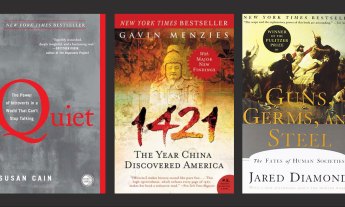
It’s time for organizations and individuals to stop focusing on dominating the competition — and learn from them instead. By identifying a Worthy Rival and looking at their strengths and abilities, we can keep improving and innovating, says writer Simon Sinek.
Professor James P. Carse has argued that there are two types of games: finite games and infinite games. In finite games, the players are known, the rules are fixed, and the end point, winners and losers are all clear, as in a game of football or chess. But in infinite games — like business or politics or life itself — the players come and go, the rules are changeable, and there is no defined end point. There are no winners or losers, just ahead and behind.
Writer Simon Sinek believes that many of the struggles faced by organizations exist because their leaders are playing an infinite game with a finite mindset. While a win-lose mode can sometimes work for the short term, it has grave consequences over the longer term. Leaders who embrace an infinite mindset have the resilience to thrive in a changing world.
One key aspect of cultivating an infinite mindset is to identify who your Worthy Rivals are — and study them. “Traditional competition forces us to take on an attitude of winning; a Worthy Rival inspires us to take on an attitude of improvement,” writes Sinek, in his new book The Infinite Game. “The former focuses our attention on the outcome; the latter focuses our attention on process … An excessive focus on beating our competition not only gets exhausting over time, it can actually stifle innovation.”
Below, he shares his experiences with his own Worthy Rival.
Whenever I heard the name “Adam Grant”, it made me uncomfortable. If I heard someone sing his praises, a wave of envy washed over me. I knew him to be a good person and a nice guy. I respected his work a great deal, and he was always nice to me when we’ve met. We do the same kind of work — write books and give talks about our views of the world.
Although there are many others who do similar work, for some reason I was obsessed with him. I wanted to outdo him. I’d regularly check the online rankings to see how my books were selling and compare them to his. Not anyone else’s rankings — just his. If mine were ranked higher, I would smile a gloaty smile and feel superior. If his were higher, I would scowl and feel annoyed. He was my main competitor and I wanted to win.
Then something happened.
We were invited to share a stage at the same event, and the interviewer thought it would be “fun” if we introduced each other. I went first. I looked at Adam, looked at the audience, and said, “You make me unbelievably insecure because all of your strengths are all my weaknesses. You can do so well the things that I really struggle to do.” The audience laughed.
Adam looked at me and responded, “The insecurity is mutual.” He went on to identify some of my strengths as areas in which he wished he could improve.
We have to stop thinking of other players as competitors to be beaten and start thinking of them as Worthy Rivals who can help us become better players.
In an instant, I understood why I felt so competitive with him. Whenever his name came up, it reminded me of the areas in which I grappled. Instead of investing my energy on improving myself — overcoming my weaknesses or building on my strengths — it was easier to focus on beating him. That’s how competition works, right? It’s a drive to win.
The problem was, all the metrics of who was ahead and who was behind were arbitrary, and I had set the standards for comparison. Plus, since there was no finish line, I was attempting to compete in an unwinnable race. I had made a classic finite-mindset blunder. The truth is, even though we do similar things, he isn’t my competitor; he is my rival. My very Worthy Rival.
To anyone who has spent time watching or playing games and sports, the notion of a finite competition where one player or one side beats the other to earn a title or prize is familiar. Indeed, to most of us, it is so ingrained that we automatically adopt an us vs. them attitude whenever there are other players in the field. However, we have to stop thinking of other players as competitors to be beaten and start thinking of them as Worthy Rivals who can help us become better players.
A Worthy Rival is another player in the game who is worthy of comparison. Worthy Rivals may be players in our industry or outside our industry; they may be our sworn enemies, our sometimes collaborators, or our colleagues. Regardless of who they are or where we find them, the main point is that they do something (or many things) as well as or better than us. They may make a superior product, command greater loyalty, lead more effectively, or act with a clearer sense of purpose than we do. We don’t need to admire everything about them, agree with them, or like them. We simply acknowledge that they have strengths and abilities from which we could learn a thing or two.
There is no value in picking other players whom we constantly outflank simply to make ourselves feel superior.
Since we get to choose our own Worthy Rivals, we should select them strategically. There is no value in picking other players whom we constantly outflank simply to make ourselves feel superior. That has little to no value to our own growth. We choose them to be our Worthy Rivals because there is something about them that reveals to us our weaknesses and pushes us to constantly improve … which is essential if we want to be strong enough to stay in the game.
A Worthy Rival can push us in a way that few others can — not even our coaches, mentors or advisors. The impact of this subtle mind shift can be profound in how we make decisions and prioritize resources. Traditional competition forces us to take on an attitude of winning; a Worthy Rival inspires us to take on an attitude of improvement. The former focuses our attention on the outcome; the latter focuses our attention on process. That simple shift in perspective immediately changes how we see our own businesses. It is the focus on process and constant improvement that reveals new skills and boosts resilience. An excessive focus on beating our competition not only gets exhausting over time, it can actually stifle innovation.
Another reason to adjust our perspective toward seeing strong players in our field as Worthy Rivals is it keeps us honest. It’s like a runner who is so obsessed with winning that they forget the rules, ethics or why they started running in the first place. They may spend time and energy to undermine someone who is running faster than they are and resort to tripping their competitor or take performance-enhancing drugs to give them a secret edge. Both tactics will absolutely increase the chances they will win the race, but will leave them ill equipped for success beyond those races. Eventually, those strategies run dry and they are still left a slow runner.
When we view the other players as Worthy Rivals, it removes the pressure of being in a win-at-any-cost struggle, so by default we feel less need to act unethically or illegally. Upholding the values by which we operate becomes more important than the score, which actually motivates us to be more honest.
In an infinite game, we accept that “being the best” is a fool’s errand and that multiple players can do well at the same time.
As for my Worthy Rival, when I thought of Adam as a competitor, it didn’t help me. Rather, it fed my finite mindset. I devoted too much time and energy to worrying about what he was doing rather than focusing that energy on how I could be better at what I do.
Since that day when I learned to shift my mindset, I no longer compare my book rankings to Adam’s (or anyone else’s, for that matter). My mindset has shifted away from channeling my feelings of insecurity against him to partnering with him to advance our common cause. We have become dear friends (he kindly gave this book a proofread and helped make it better), and I feel genuine happiness when I hear his name or see that he is doing well. I want his ideas to spread. In fact, everyone reading this book should also read Give and Take and Originals; they are both essential reading in and out of the business world.
In an infinite game, we can both succeed (and, as it turns out, people can actually buy more than one book). An infinite mindset embraces abundance, whereas a finite mindset operates with a scarcity mentality. In an infinite game, we accept that “being the best” is a fool’s errand and that multiple players can do well at the same time.
As hard as it may be to recognize a player as one of our Worthy Rivals, especially if we find them disagreeable, to do so is the best way to become better players ourselves. “The more I questioned these guys, the more I came to understand that the successful criminals were good profilers,” explained John Douglas, retired FBI unit chief and pioneer in criminal profiling. Douglas understood that, as unconscionable as we all find serial killers, the best way to catch one was to acknowledge that they were very good at the exact same thing that the FBI does … which meant the FBI had to be better. Having Worthy Rivals — criminals adept at evading the FBI — pushes the FBI to constantly improve their techniques.
Failure to have a Worthy Rival increases the risk that a once-mighty infinite player will gently slide into becoming just another finite player looking to rack up wins.
Having a rival worthy of comparison does not mean that their cause is moral, ethical or serves the greater good. It just means they excel at certain things and reveal to us where we can make improvements. The very manner in which they play the game can challenge us, inspire us or force us to improve. Who we choose to be our Worthy Rivals is entirely up to us. And it is in the best interest of the infinite game to keep our options open.
Knowing who our Worthy Rivals are is the best way to help us improve and adapt before it’s too late. Blockbuster — the sole superpower in the movie rental business — failed to appreciate that a small company like Netflix and an emerging technology like the internet required them to reexamine their entire business model. Taxi companies chose to sue ridesharing companies to protect their business instead of learning how to adapt and provide a better taxi service. Sears got so big and so rich from sending out paper catalogs for decades that they were too slow to adapt to the rise of big-box stores like Walmart and to ecommerce. And believing itself without a Worthy Rival, the behemoth that was MySpace didn’t even see Facebook coming.
Without a Worthy Rival, we risk losing our humility and our agility. Failure to have a Worthy Rival increases the risk that a once-mighty infinite player will gently slide into becoming just another finite player looking to rack up wins. Where once the organization fought primarily for the good of others, without a Worthy Rival they are more likely to fight for the good of themselves. When that happens and when hubris sets in, the organization will quickly find its weaknesses exposed and without the kind of extreme flexibility they need to stay in the game.
Excerpted with permission from the new book The Infinite Game by Simon Sinek. Published by Portfolio, an imprint of Penguin Publishing Group, a division of Penguin Random House, LLC. © 2019 by RedCar, LLC.
Watch Simon Sinek’s TED Talk now:












